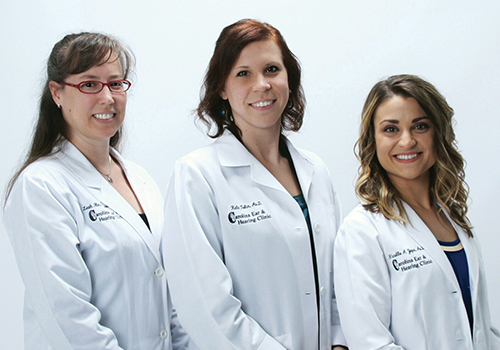1. Hearing loss only affects the elderly.
Although statistics (NIDCD, 2010) show that one in three people ages 65+ have hearing loss, about 20 percent of all Americans report some loss. Approximately 15 percent of those ages 20-69 have hearing loss due to noise exposure at work and leisure activities (Center for Disease Control).
2. It doesn’t affect my overall health.
One of the latest research topics involves the link between hearing loss and dementia. Due to the effects of hearing loss on the hearing centers of the brain and our socioemotional health, untreated hearing loss increases the risk of dementia*. Taking action sooner is always better.
The hearing and balance systems are interconnected. According to a study by physicians at Johns Hopkins University, patients with even a mild hearing loss were three times more likely to have a history of falling. The theory is that those who cannot hear well may not have optimal awareness of their environment, leading to an increased risk of injury.
According to the American Diabetes Association, patients with diabetes are twice as likely to acquire hearing loss and nearly 30 million Americans have diabetes. Diabetes is known to affect vital blood supply throughout the body as well as our ears. When blood supply to the ears is restricted, hearing loss may result.
Doctors of Audiology (Leah Fleischhauer, Kathleen Tolin, Nicolle Yopa) are experts in hearing healthcare including hearing aids, cochlear implants, osseointegrated devices, electrophysiology, hearing rehabilitation, balance testing/treatment, and community education.
3. People just need to speak louder.
In most cases of hearing loss, the hearing system is like a faulty microphone; when one raises the overall volume too much (i.e., shouts), the signal becomes distorted and harder to understand. Hearing devices properly fit provide amplification in the areas of hearing loss without over-amplifying which helps prevent distortion.
4. I can’t hear because of the ringing in my ears.
Tinnitus is an umbrella term that includes any sound in your ears/head. There are many causes of tinnitus, the most common being hearing loss. When the hearing nerve is deprived of stimulation, the brain goes in search of what it is missing and creates its own internal sound. It is vital to talk to a Doctor of Audiology to determine the best treatment. Tinnitus affects 50 million people in the United States. You are not alone and we are here to help.
5. My primary care physician (PCP) will tell me if I need hearing aids.
If you suspect hearing loss, simply request a referral from your PCP to see an audiologist who can fully diagnose its underlying cause. It is important that you take control of your hearing health and inform your PCP because only about 48 percent of physicians refer patients for a comprehensive hearing evaluation. This may be caused by varying PCP appointment lengths that are often mediated by several factors precluding hearing loss/balance screenings. Most insurance plans cover hearing evaluations; treatment consultations are without charge at some clinics to educate you on your hearing loss and the best evidence-based treatment options.
* The ability to understand speech can also decline, a phenomenon called auditory deprivation.


